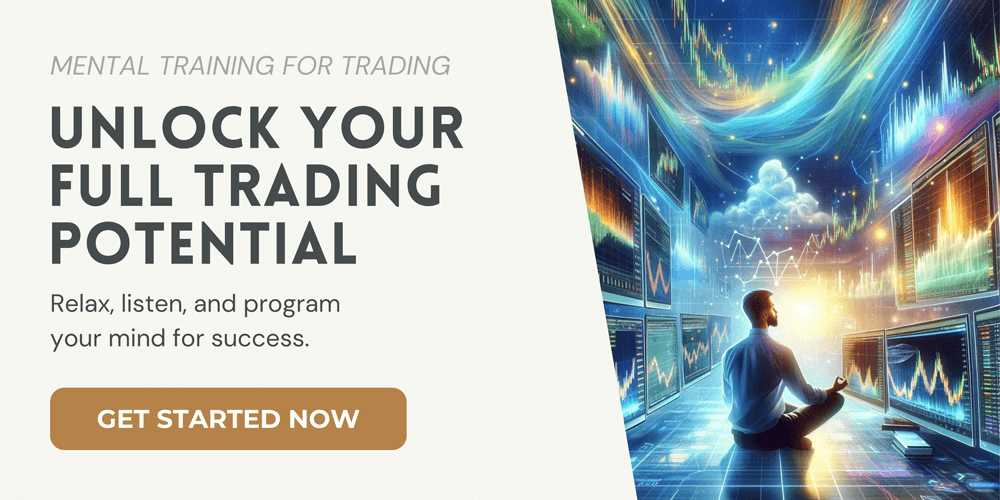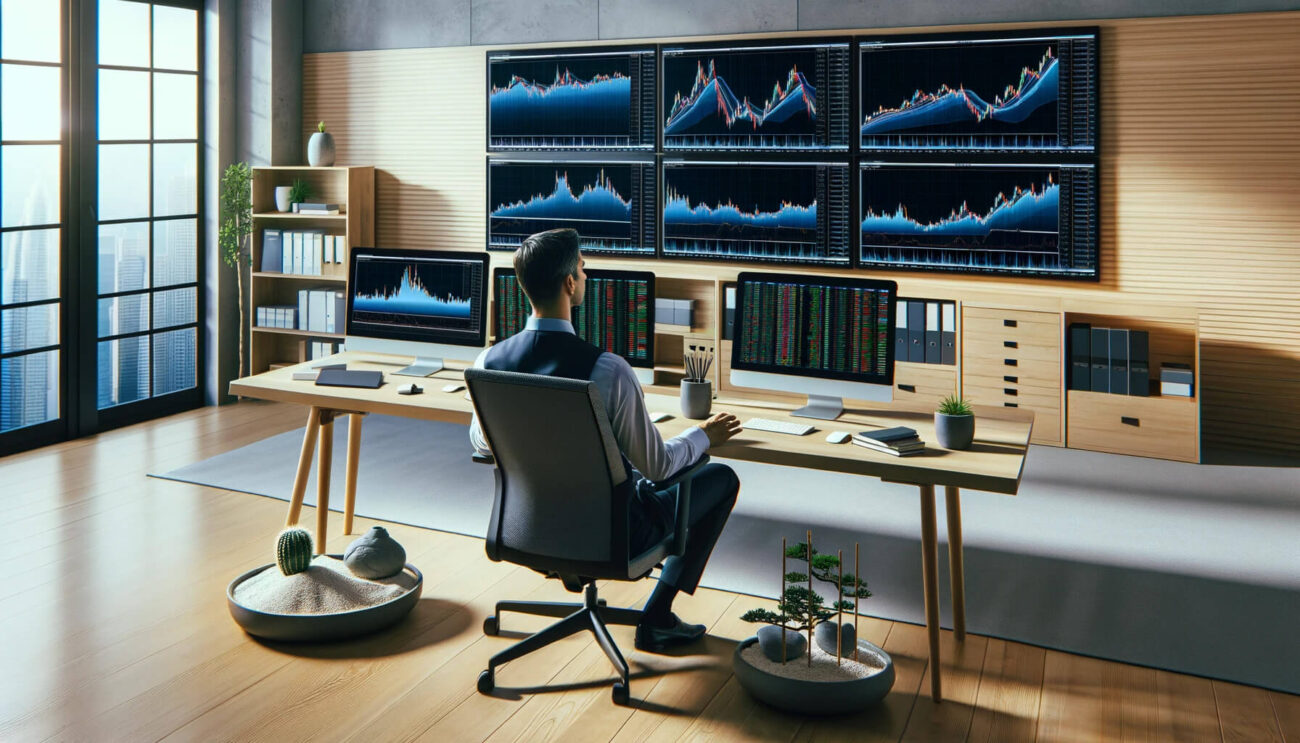Discover the art of successful trading beyond charts and analysis: Our article delves into the often underestimated world of mental and emotional balance. Learn how you can not only improve your decision-making but also optimize your trading performance through proven stress management techniques and targeted mental training for trading.
In the world of trading, managing stress is not just a desirable skill, but a fundamental necessity. The volatile nature of the financial markets, combined with the fast pace and constant uncertainty, creates an inherently stressful environment. Traders are regularly faced with situations that require quick decisions under pressure, often coupled with significant financial risk. In this context, stress management becomes an integral part of every successful trading approach.
Stress in trading can manifest in many ways. It can arise from the fear of losses, the pressure to achieve constant gains, or the overwhelming amount of information and data that need to be processed daily. The ability to effectively manage this stress not only affects the mental and emotional states of traders but also their trading decisions and ultimately their profitability. Without proper stress management, traders may tend to make impulsive decisions, abandon their strategies, and fall into the trap of emotionally driven trading.
A key aspect of stress management in trading is understanding that stress is not always negative. To a certain extent, stress can motivate traders to stay focused and sharpen their skills. The problem arises when stress becomes overwhelming and impairs the trader’s ability to make rational and well-thought-out decisions. Therefore, it is vital to find a balance where stress acts as a motivating factor, but not a debilitating one.
The Role of Stress in Trading

Time-Induced Stress
Time-induced stress often occurs in situations where traders are under time pressure to make quick decisions. This can be caused by market events such as sudden price changes or trading with very short-term deadlines. This type of stress often leads to a heightened tendency to place more weight on extreme loss scenarios, as shown by the study of Gelman & Kliger (2020). This tendency can lead traders to make more conservative or risk-averse trading decisions, reflected in the slope of the implied volatility function of options.
Acute Stress
Acute stress is typically a reaction to unexpected events or challenges and can provoke a short-term but intense emotional and physiological response. The study by Buckert et al. (2014) showed that acute stress affects economic decision-making under risk. Interestingly, acute stress led to more risk-seeking behavior in certain situations, especially among individuals who showed a strong cortisol response to stress. However, this effect was not observed in decisions under ambiguity.
Impacts on Trading Decisions and Risk Behavior
The reactions to time-induced and acute stress have significant impacts on traders’ decision-making and risk behavior. While time-induced stress can lead to a more cautious approach, acute stress can sometimes induce a higher willingness to take risks. Both reactions can be problematic: overly cautious behavior can miss opportunities, while excessive risk-taking can lead to hasty decisions and potentially greater losses.
Understanding these dynamic interactions between stress and trading behavior is of great importance for traders. By recognizing how stress affects their decision-making, they can develop conscious strategies to counteract these influences.
Techniques for Stress Management
Effective stress management for traders encompasses a variety of approaches and methods aimed at managing both time-induced and acute stress. A fundamental understanding of these techniques is crucial for traders to thrive under the often challenging conditions of the financial markets.
Managing Time-Induced Stress
Time-induced stress often occurs in situations requiring quick decisions. A key strategy to manage this stress is effective time management. Traders should learn to carefully plan their trading activities, including preparing for various market scenarios. Staying informed about upcoming economic events and adjusting trading strategies accordingly is essential. Setting clear trading goals and adhering to a predefined trading plan can help reduce the stress caused by uncertainty and ad-hoc decisions.
Another important technique in stress management for traders is task prioritization. By identifying the most critical trading actions and focusing on them, traders can avoid getting lost in less relevant activities. This helps reduce the feeling of being overwhelmed and allows focusing on the essentials.
Managing Acute Stress
Acute stress often requires immediate attention and can be effectively handled with techniques such as breathing exercises and mindfulness. Breathing exercises, like deep breathing, help calm the body and clear the mind. This enables traders to step back and view their situation more objectively.
Mindfulness exercises are also a vital part of stress management. Through mindfulness practices, traders can learn to be present in the moment, which allows them to distance themselves from the emotional reaction to stressful events. This promotes a calmer approach to trading and helps avoid impulsive behavior.
The Role of Mental Strength and Emotional Balance

These include self-reflection and setting realistic expectations. Traders should regularly review their trading decisions and strategies and learn from their experiences. This helps develop a better understanding of their own strengths and weaknesses and promotes a realistic approach to trading.
Stress management is an integral part of successful trading. By applying practical strategies to manage time-induced stress, utilizing methods to handle acute stress, and promoting mental strength and emotional balance, traders can learn to cope with market challenges. This enables them to make informed decisions and significantly contributes to their long-term success.
Developing a Stress-Resistant Mindset
A central aspect in stress management for traders is the development of a stress-resistant, goal-oriented mindset. In the turbulent world of trading, it is imperative to remain mentally robust and focused to achieve consistent success. Such a mindset enables traders to face the challenges of trading with confidence and strategic clarity. This is achieved through targeted “mental training for trading,” which aims to strengthen inner resilience and promote a clear focus.
Importance of a Goal-Oriented Mindset
A goal-oriented mindset helps traders to focus their attention on their long-term goals and strategies, rather than being distracted by short-term market fluctuations. This includes the ability to look beyond the moment and develop a long-term perspective in trading. Such a mindset allows for making rational and well-considered decisions, even in phases of high volatility.
Role of Mental Training in Trading
Mental training is an indispensable tool in stress management for traders. It includes techniques and exercises aimed at sharpening awareness of one’s own thought and behavior patterns. This can be achieved through meditation, visualization techniques, and positive self-talk. Such practices not only help in reducing stress but also in cultivating a positive and success-oriented attitude.
Techniques to Promote a Stress-Resistant Mindset
- Visualization Techniques: Regular practice of visualizations, in which trading success scenarios are played out, strengthens confidence in one’s own abilities and strategies.
- Mindfulness and Meditation: These practices promote mental clarity and help in detaching from negative thought patterns. They assist traders in being present in the moment and effectively regulating their emotions.
- Positive Self-Talk: Developing a constructive internal dialogue can significantly contribute to overcoming self-doubt and negative thought spirals. This strengthens self-confidence and resilience.
Implementation in Daily Trading
Implementing these techniques in daily life is essential for developing a stress-resistant mindset. This can be achieved through regular mental training sessions, integrating mindfulness exercises into the daily routine, and through conscious reflection of one’s own actions. By learning to consciously control their thoughts and emotions, traders can develop mental strength that enables them to remain calm and focused even in stressful situations.
Thus, developing a stress-resistant mindset in trading is an ongoing process that requires commitment and conscious effort. However, through targeted mental training and the application of practical techniques, traders can learn to master their emotions, sharpen their focus, and ultimately optimize their trading performance. This leads to improved decision-making, increased trading success, and an overall more fulfilling trading experience.
Master the Market
In conclusion, stress management for traders is an indispensable component for anyone wishing to succeed in the trading environment. We have discussed various aspects and techniques of stress management, ranging from coping with time-induced and acute stress to developing a goal-oriented, stress-resistant mindset. Integrating these practices into daily trading significantly contributes to improved trading performance.









Leave a comment